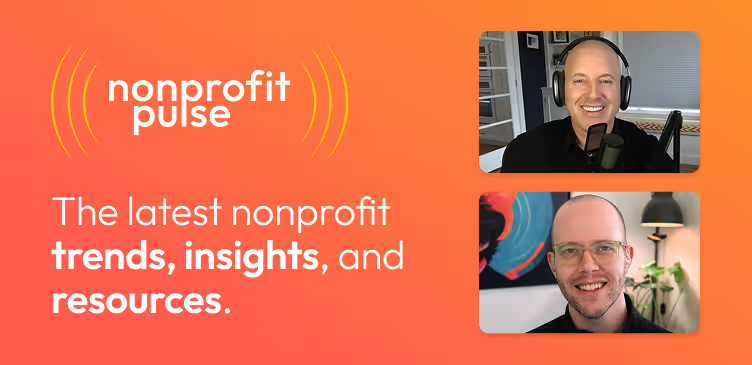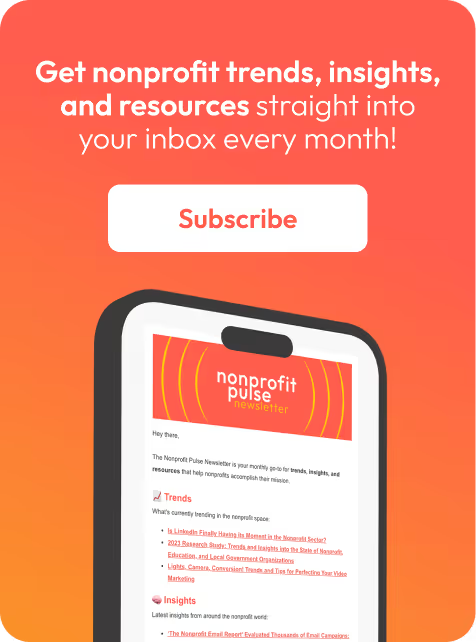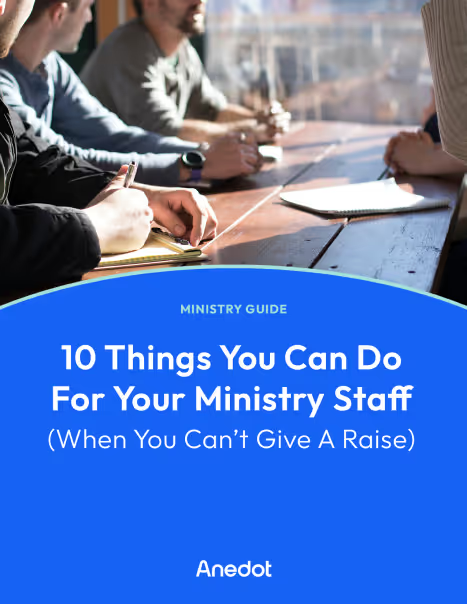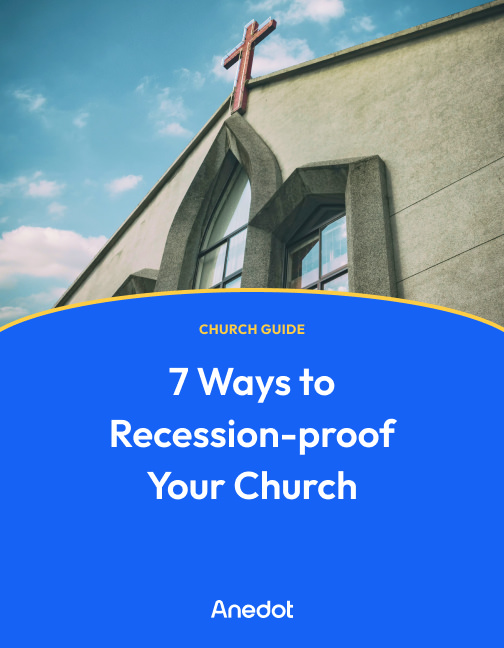Video transcript ↓
Michael:
Dealing with issues at events too are gonna come up because volunteers again, they don't know what happened beforehand, what's going on in the background.
So they'll ask a lot of questions, they'll ask can I do this? Can I do that?
It's keeping them on task, keeping them inspired, keeping them, we're here for a reason, we're here to help our state party raise money to elect this person or that person.
It's keeping them on a mission basically 'cause we're all part of the team and we're all hold accountable to each other that way.
Patrick:
Hey there, this is Patrick with Anedot. Today we're having a conversation about planning and executing fundraising galas.
I'm joined by Mikey Swetz, Vice President at Arena LLC. How are you doing today, Mikey?
Michael:
Doing awesome, how are you?
Patrick:
I'm doing great, it's a great day. So can you tell me just to get started.
Can you tell me a little bit more about who you serve and the type of events that you've planned for your clients?
Michael:
Yeah, so right now I'm at Arena LLC out in Salt Lake City.
We're with clients ranging from the state political parties to congressional senate and a lot of nonprofits too here.
Patrick:
Yeah, so clearly you have a really strong background in this area Mikey. I think you've probably done events in quite a few states.
So you could talk about that a little bit but how did you get started in all this and how did you learn what you now know?
Michael:
Yeah, so I started back in 2011, so about 10 years ago now at a US Senate campaign in Connecticut. My first job out of college in politics.
I learned a lot from the fundraiser there who was a good friend of mine and her and I planned all the campaigns events. So I learned a lot from her.
She was kind of like my inspiration for wanting to do fundraising and events in the first place.
I started from there and then from there went to a small state party, and then to another small state party after that. But at those state parties we held big galas, which were annual events that had to be thrown without a hitch.
So I learned a lot from all my bosses that I had and all these jobs and then eventually I went to the Republican National Committee where I helped all 50 states with a lot of their events.
I am now teaching event fundraising, because I've been doing so many, hundreds at this point of big events, small events, round table events, you name it, I've done it because they're fun.
They're fun to me, they're fun planning the event, they're fun during the event. Again, I work well under stress at these events too.
I like kind of the craziness of the day and then the best part is after the event. It's a really good feeling that you raised a lot of money but also have fun doing it.
Patrick:
Yeah, for sure and I'm guessing with somebody like you who likes work under stress, it's probably a little bit of an adrenaline rush too, isn't it?
Michael:
Oh, yeah. If something can go wrong and will wrong with the event but that's part of the process too of you planning is make sure nothing goes wrong in the first place.
That's kind of the fun of it too, is planning the best events that you can and you can do better each time you do an event. And that's part of the challenge.
I challenge myself to every time is how can I do better than the last time?
Patrick:
That's awesome. I know you and I have had a little bit of experience working together on a large scale event or two and I've always found your professionalism to be extremely helpful.
Tips for planning a fundraising gala

Patrick:
How far out do you start the planning process and what do you focus on first?
Michael:
As soon as you can, as soon as the event idea comes into play with your team, the planning process starts right then and there, because the more organized you are at the beginning, the better the event will be afterwards.
As soon as you have a date or a theme or an idea, or a speaker that wants to come in, start planning what kind of event it's going to be, who am I inviting, how am I pricing it? Is it worth the time that we're gonna spend to do it?
Patrick:
So let's say you have a dinner that's maybe 500 people or larger, right?
You have like a large dinner, is there a period of time that's too late? Is there like a minimum number of time that you should be thinking how far out?
Michael:
It depends on how big the event is.
If it's a small cocktail reception, I mean, a week or two lead time is probably fine, but if you're planning a big gala with 500-plus people you're gonna need at least a month, maybe more.
You need a lot more lead time on that because you have a lot more planning, you have vendors to deal with, you have people to make sure you get to 500 people at that event as well.
Patrick:
Yeah, and as you're thinking, as you are doing this planning process, do you have any advice on like the process for finding the right companies to work with?
'Cause I have to think for larger ones, you've got a venue, you've got catering, you've got AV, you've kinda got a lot of different pieces there.
Do you have a process for trying to find the right people to work with?
Michael:
Yeah, I mean, in my experience I try to find vetted vendors that people have used before, get references for them as well because you can search audio and visual on Google and find the first company that pops up in your city but you wanna make sure they're good at their job, good at what they do, good at camera work, working with the press as well, because I'm sure the press will be at a lot of these events.
And depending on what party you're working with or what kind of candidate you are, some are exclusive to one or the other.
You research that kind of thing because you wanna have a good event because the better your event the more happy people will be and the better the next one will be as well.
Patrick:
Yeah, that makes a lot of sense.
How to boost attendance at a fundraising gala

Patrick:
And you had mentioned too that part of the reason that you might need to be a month, two months, three months out, is that event attendance, right?
So, the worst thing that can happen in an event is you plan the event and nobody shows up. That's not good for the speaker, it's not good if you do have press there.
So as you're planning the event, what have you found has had the greatest impact on event attendance?
Is it the amount of time the organization leaders spend on fundraising calls? Is it the speaker, the location?
So what are the biggest impact points when it comes to actually getting attendance?
Michael:
All the above, really, the attendance too, you can't rely on one channel to get people to come to your event.
So I've seen some groups do just email hoping for the best but you have to do email, you have to do phone calls, you have to do reach out to your networks and have them email their networks and call their networks.
Sometimes going on radio local radio shows helps as well because not everyone is using the internet so frequently.
And then if it's a bigger event and more fancier event, paper invitations are also great to a larger audience, to your target audience.
→ Learn how to create an email list, how to make engaging email content, and more nonprofit email marketing best practices!
Patrick:
And if you're ever in a scenario where maybe the attendance wasn't where you want it to be, have you ever been in a situation where maybe an organization decided they needed to pull the plug and how do you make that decision?
Is there a good guideline on that or things people could think about?
Michael:
I've never pulled the plug on an event but there are times where events weren't as heavily attended as we would like them to be, that's why knowing your head count before you go into the event, which is why making sure you have a daily register, a checklist that you go through of people who are coming, people who might come, people who might not come.
So you have kind of an exact head count what you're going into. And I would expect at least 10% to drop off and then 10% might show up at the door too. So you might have an even scale there.
But that's why being a good event planner is being 10 steps ahead of the game.
So, say you're having a big fundraising gala with 50 tables and one table called you and said I can't show up yet or tonight, have the staff at that venue roll that table out quickly before anyone can see it being rolled out, so they don't know there's an empty table there.
Or if you're having a cocktail reception, not as many people show up, make sure you have flexibility with the space of the room that you can make it smaller, make it look smaller, so it's more intimate and it looks like it's supposed to be that full.
So being 10 steps ahead of the game is always the most important part of being a fundraiser or an event planner.
Patrick:
Do you usually recommend having day of sales or just closing it off completely?
'Cause I know that's probably a question somebody would ask next is well, what if we're taking a day of. What's kind of your advice on sort of day of sort of ticket sales?
Michael:
Well, when you're in the political realm you never say no to money that comes in.
So, day of sales are always suggested if you still need to fill the room or otherwise you could have a good problem and have people that bought tickets beforehand, you've sold a room out, there's no more space, then you can't sell tickets day of or have them on a waiting list and then have them pay day of if there's room, if someone cancels at the last day, but because we're in a tight money business, tight budget business, we never say no at the door.
Sometimes we have overflow rooms too. If they wanna come in just to watch at a screen. Again, we say yes to money that wants to be given to our organization or our campaign.
Patrick:
Yeah, and I know one thing we've introduced recently is a QR code scanner so that way at the door, it might be a little bit easier to at least relieve the stress right of people coming in.
'Cause I've always found it, look, the sooner that somebody can go and they can RSVP, the better for you because you have that receipt and you know.
The toughest one is when you have so many people at the door and then it becomes a lot harder.
So, it does make a lot of sense.
Where to find volunteers for a fundraising gala

Patrick:
When you're planning these events, how many staff members or volunteers are usually involved in the planning process, both on the terms of planning and then on the day of, and then how do you usually find these people, these helpers?
Michael:
Most campaigns and state parties and organizations, you have a smaller staff so everyone's involved from the start of the event, they all have their own job. Someone's in charge of registration, the press, the vendors, things like that.
But you also need a lot of volunteers if you have a bigger event to make it go out without a hitch, because you want their first impression to be great, you want there last impression to be great with your event.
So if you have your next event, they keep coming back. But plan for over-staffing our event just in case volunteers do drop off 'cause you can never have enough help at these events.
You can have greeters at the door, have people helping with registration, make it go smooth.
That's always probably the worst part of events is the registration, the line or the holdup or anything regarding registration.
But having volunteers help with seating, having volunteers help at the cocktail reception.
No matter what part of the event that you have, have someone there, whether it's staff or a volunteer working there because you want to make sure that your attendees who are paying to go to your event have the best time possible.
Patrick:
Yeah, and you bring a good point there too and it kind of goes in the planning process, right?
Because if you know each area, like let's say the registration needs four people and this needs two people, well, then you can assign certain people there and then have fill in and things like that.
And that's probably something a lot of people do forget about is it's not just having a lot of volunteers, but then making sure they know where they need to go, they're properly trained in what they're doing and it allows you to move people in and out based on who you've got.
Michael:
Exactly, and then the day before the event, if it's a bigger event, we have a volunteer meeting.
So they all come to the venue a day early, so they can see the venue, they get to know the venue, they know their jobs, they know who their head volunteer or head staff members is they are gonna follow orders from.
So that's probably the most helpful too with volunteers is make sure they know the space and they know what they're doing as they come in because if they come in not knowing what they're doing, then you kind of have a messy event for the first hour or so.
How to lead and manage fundraising gala volunteers

Patrick:
Yeah, so you've talked a little bit about having a team, delegating, making sure that it's not just you, that the team is doing a lot of things.
Sometimes you have great team members, sometimes you have team members that you wish handled things a little bit differently.
Do you have any advice on sort of leading and managing a team when it comes to this kind of event?
And how you can encourage teamwork between people who maybe haven't worked together before?
Michael:
Yeah, holding everyone accountable and not just myself as leader to them, but them to me as well.
That helps both of us and all of us do better and being inspiring to them too as well because we're all gonna be stressed at this event, planning the event.
So touching base daily is gonna be key as well on what was done today? What can we do tomorrow? Having in-person meetings every week might help as well.
If it's a bigger event, you want to be very successful but you don't want everyone to get too stressed where kind of your stress trickles down to them. You want to make them seem like the event's going great.
Every event's gonna have a stressful background at the event but as long as no guests see that stress at the event, then your event went well.
Being a team leader and making sure that everything's done, where everyone's holding someone accountable is probably the best bet for your team.
Patrick:
There's one thing that you said I kind of sort of latched onto 'cause it's funny, it's kind of an anodontism, here to help, right?
And I do think approaching things always, it's like kind of like you said is you're advising your team too, making them always think about in that sort of mindset of I'm here to help and that always helps fix things, right?
'Cause you might have difficult situations or people might be difficult, but if you're in that attitude of here to help, it helps make it a lot less stressful.
Michael:
Exactly, and you wanna make sure that your team knows that you're gonna be as helpful as possible, especially with your team and the volunteers make sure there are leaders for your volunteers.
So you wanna inspire them to be good leaders to the volunteers as well, because bigger events might have up to a hundred volunteers and they all have the little groups that they work with.
Dealing with issues at events too are gonna come up because volunteers, again, they're day of.
They don't know what happened beforehand, what's going on in the background. So they'll ask a lot of questions, they'll ask can I do this, can I do that?
It's keeping them on task, keeping them inspired, keeping them, we're here for a reason, we're here to help our state party raise money to elect this person or that person.
It's keeping them on a mission basically 'cause we're all part of the team and we're all hold accountable to each other that way.
What to be ready for on the day of the fundraising gala

Patrick:
Yeah, so when you're doing an event, right? Obviously you've done quite a few.
For you what is it like on the day of the event? Do you think the stress levels are high? Does it feel like smooth sailing?
Can you give some pointers maybe to people that are saying, hey, I'm planning my first one. What is it like, what should I feel, what should I be ready for?
Michael:
Well, I work best under stress too when it comes to these events.
But yes, every event is stressful until everyone's sitting down in their seats and the event starts that's when you can finally breathe.
But as the head event planner you're running around all day, trying to get things ready, trying to get things set up or talk to the vendors, talk to the hotel staff or the venue staff, wherever you are.
They are stressful but if you're organized up to the event, you should be as prepared as possible.
The most important piece of an event that I think is line by line where it's written out minute by minute, what's going on, who's supposed to be where, who's speaking when.
That's your guideline for the entire day from start to finish. So you know if something's off, you'll see on the timeline.
Patrick:
Yeah, and I would think too you probably share that timeline with quite a few people, right?
So I would think that the speaker and other people that have roles in the event, they probably need to know exactly where they're supposed to be minute by minute, right?
Michael:
Exactly. Especially if we're working with high level speakers, they wanna know exactly when they should be going into the door, is there a back hall they're walking through, where's the backstage?
Again, that's all under line by line and you should have a map in there as well of the venue and the kind of the steps they take from start to finish.
And everyone who's involved in any part of the event should be on that line by line and have a copy of it so they know what is supposed to be when, and if something happens, there's a backup plan.
Someone could take over quickly for another job 'cause they have the line by line, they know what to do.
How to find and secure fundraising gala speakers

Patrick:
Yeah, specifically on featured speakers, do you have any advice on finding those speakers and sort of approaching them in a way that makes them more likely to say yes?
And what are some of the advice or tips that you have to sort of get that person and make it more likely they're gonna say yes and then put them in a position for success?
Michael:
Yeah, so definitely invite someone that's going to attract people in your region, your state, your district, wherever you are looking for, especially in political culture right now.
Find someone who your people will pay to see, and how much will they pay to see that person.
Typically for campaigns and state parties that we work with too, we say, look in the region first, who is gonna be easily accessible?
Because if you're in New Hampshire and you want the majority leader of the house to come from California all the way to New Hampshire, it's gonna be at least a three day journey for them.
A day there, a day at the event, a day back. So make sure that you look for someone who's practical.
A rule of thumb as well as we did for all of our events too was not to pay speaker fees if you're a political organization because your job is to raise money, not to keep spending it.
So if someone's asking for a speaking fee, unless you can afford that cost or you can reason that cost with your budget, find someone who's gonna come to your event for free and you can pay their travel and lodging, that that's normal.
Look for who's best for your budget and who's best for your audience.
Patrick:
Yeah, and I think that's probably a good example too. We obviously work with a lot of nonprofits, universities, things like that.
And I think that's probably a good example for them as well too.
Let's say a university needs to bring in alumni, right, to just sort of kind of understand that hey look, this is a fundraising event, we are asking you to help us and finding something that's not too big of an ask. I guess that that probably would make a whole lot of sense.
Michael:
Yeah, there are some great speakers out there that do charge money and if you can afford it in your budget, then great bring them in 'cause they'll draw a huge crowd.
But again, look at your budget first before making those big decisions.
How to navigate last-minute changes at a fundraising gala

Patrick:
Yeah, and as you're looking at the event, galas can have their fair share of mishaps, last minute changes.
Obviously you don't need to out anyone, but can you give sort of like a general example of maybe an example or two of last minute changes that happened and then what you were able to do to kind of navigate that situation?
Michael:
Sure, so I'm gonna guess 2016 was probably the biggest event I did and that had the most challenges coming up and during the event, but we had all the presidential candidates from around the country come to our Big, and we called it a Big Summit.
At last minute we were told the police had to be there so we had to hire police and also they had to come in and set things up and Secret Service as well for some of those candidates.
So those last minute things can hurt the process, but it's not impossible to fix.
Again, if you're organized, you have a map, you have everything, you have the step by step, where people are going, then it should be easily fixed.
So whoever the head event planner is, should be working with that and moving things around, getting help too because if you have volunteers that can help, great, if you have other staff that can help, also great, but things do happen last minute, especially if you're dealing with Secret Service and police, because they want things so specifically and to code.
So just make sure before events like that, do I need police? Do I need extra security for whatever reason?
Patrick:
And that's a good thing to tie back to featured speaker too.
Something I learned working with you and working with others is that if you do have something where you have a Secret Service, or let's say you're bringing in a CEO that has significant security and requirements, sometimes that impacts the vendors you use too, right?
Because you wanna make sure that you're getting the audio video they require. And sometimes there's no impact, right?
You can just go with your basic hotel and what they've got, but that's another thing too on the featured speaker side is making sure you understand their specifications for sure.
Michael:
Exactly.
Two types of fundraising gala budgets to consider

Patrick:
And kind of tying into that, when it does come to budgeting and logistics for the event, I just mentioned kind of the featured speaker and how that can play into your budget and logistics.
But is there anything else that you can recommend to make sure that you stay on time and on budget as it relates to things?
Michael:
Yeah, listing everything out early and planning ahead of time is the most important part.
So if you are planning to have a speaker and you don't know who's gonna pay their lodging or their travel, put it in there anyways just in case.
That expense does come up 'cause you don't wanna be as surprised, two days after the event you get an invoice for plane and then a hotel.
Your audio visual and all your vendors prices can be negotiated.
So I say, when you make budgets have a Cadillac budget and then have a must have budget because if you raise more money and you can do a little more with your event then great, make it look better.
If not, a small stage and no background is also common, but again, that's all due to budget.
I love events that have a really nice background because the press usually is always there at these kinds of events and you want your event to look great on TV or on print.
So budgeting everything ahead of time, talking with your vendors, getting the prices as low as you can go, especially if you've got at a hotel and you're getting catering.
They say, oh, our lowest package is $80 a person. Well you say, well, I can afford $50 a person, what can you give me for that?
Because that's in your budget and they'll make some kind of menu for you that way.
Patrick:
Kinda tied to that, it seems like a lot of folks sometimes overspend on food.
So that's probably a good piece of advice too that this is a fundraising event, you're trying to raise money.
Michael:
You're trying to raise money and they're trying to make money. So again, there's a game you can play with negotiating back and forth.
Patrick:
Yeah, that makes a lot of sense.
Technology used for planning a fundraising gala

Patrick:
As you are doing this kind of things with event planning and looking at what you're doing, how much would you say is technology, that you lean on technology and what are some things that maybe are a little more old school?
Michael:
Technology as of the last, what, 10 years maybe now, when Google came into play, Google Drive, everyone can collaborate on the same things.
So what I do for events is I make a full Google Doc or a Google Sheet that has tabs for every single part of the event, whether it's registration, press, decorations, budget, everything else is all on there so no matter who you're working with, can go to that budget and see anything at any certain time 'cause it updates live.
But old school is, I like to write everything down, my to-do list is always written down even in my work now, I have attend to-do lists, one's urgent, one's not so urgent.
Things like that help because writing it down helps you remember and you can cross things off. It feels good to cross to-do lists off.
So that's one of the old school things that I do, that I recommend everyone doing is use both. Use a healthy kind of option of both.
The hardest part of planning a fundraising gala

Patrick:
And it's probably everyone has different, right?
No matter what, everyone's gonna have a little bit of different process so do what works for you.
So as you're planning, what do you find the hardest part of the entire process?
Like as you're planning and trying to get ready, like what is typically the hardest part as you're going through that?
Michael:
If you're the event planner, managing everybody and everything. But the hardest part usually for bigger events is getting people there.
So you gotta be creative.
In the political world too we create different ticket prices, some for college students, some for state representatives, some for people who are monthly giving via recurring donations to the party or to the campaign, things like that.
Getting people to the event is probably the hardest part and the most nerve wracking part because you want to have a good event, you wanna show your boss that you're doing great.
You also wanna raise the most money you can. So that's probably the most nerve wracking hard part of the event because it's not easy all the time.
Patrick:
Yeah, for sure and keeping everyone happy is very difficult.
I got to think as you're planning seating for the event, that can be very difficult keeping everyone happy.
Are there any pitfalls, anyone that's listening to us, is there any pitfalls that they should be avoiding when they're looking at planning seating for an event?
Michael:
Yeah, well, seating, I mean, it can be as chaotic or as organized as you want it to be basically.
So if you have more than 20 tables and can have a seating chart and what table number it is, who's hosting that table, if there's a host for that table.
One trick I use for almost all seated events is we give out name tags and on their name tag is their table number in small letters in the bottom so they know always what their table is, so they can find it easy, they can have volunteers help them find it easily.
But having volunteers at seating as well, more than one is also super helpful because at the day of the event, you're trying to get everyone sat down at once, the faster, the better.
Patrick:
Yeah, a hundred percent. I mean, it's like, hey, let's make sure everyone knows where they need to be, get that done and be good.
Closing thoughts

Patrick:
You've given us a lot of good advice today, is there any other takeaways or just things that people should be thinking about that you'd like to sort of say that maybe we haven't talked about yet?
Michael:
Yeah, I mean, really it's just planning 'cause I've seen so many events go downhill because of not being planned well enough and not being planned fully.
It's so easy to just get on with it and hope for the best when you get there and say, everything will work out, which doesn't always happen for fundraising events.
If you don't plan, it will never happen for you.
But that's probably the biggest thing for me is planning. The day you know the event's going to happen, make your budget, what kind of event is it?
'Cause there's so many types of events you can do, whether it's a themed event, a gala, a cocktail reception, a round table, no matter what it is, it's always good to plan that way.
And another good tip to make even more money for your campaign or your organization is to have multi-tiered events.
So if you have someone great that's coming to speak, have a VIP reception with them, have a VIP round table with them, people will pay more money to sit down with them intimately and ask a few questions or even just have a glass of wine with them.
So things like that to make even more money for wherever you're planning for is always the best.
Patrick:
I mean, that makes a ton of sense, to make sure everyone has sort of what they want and the experience that they're gonna get.
So, Arena LLC, you all do fundraising, you do digital fundraising, direct mail, quite a few things that can help with campaigns and other organizations.
If somebody wants to find you and wants to find Arena LLC, where would they find you?
Michael:
You can go to arenawins.com.
You can see all of our services there from advertising to websites, to digital fundraising, which is what we do here.
So, please look us up and give us a shout.
Patrick:
Yeah, again, this is Mikey Swetz, Vice President with Arena LLC.
Thank you for being with us today and sharing your insights on planning and executing fundraising galas.
Michael:
Thank you, Patrick and thank you, Anedot.
Patrick:
Hey, thanks for watching this episode of "Learn From The Pros."
Check out our previous episode of "Learn From The Pros" where we interview Shannon Whitt on the important things to consider when hosting a virtual fundraiser.
If you got something out of this video, be sure to leave a comment on our YouTube video with your biggest takeaway.
Also, be sure to like, subscribe to Anedot on YouTube, and hit that notification bell for more videos like these. I'm Patrick with Anedot, and I will see you on the next one.
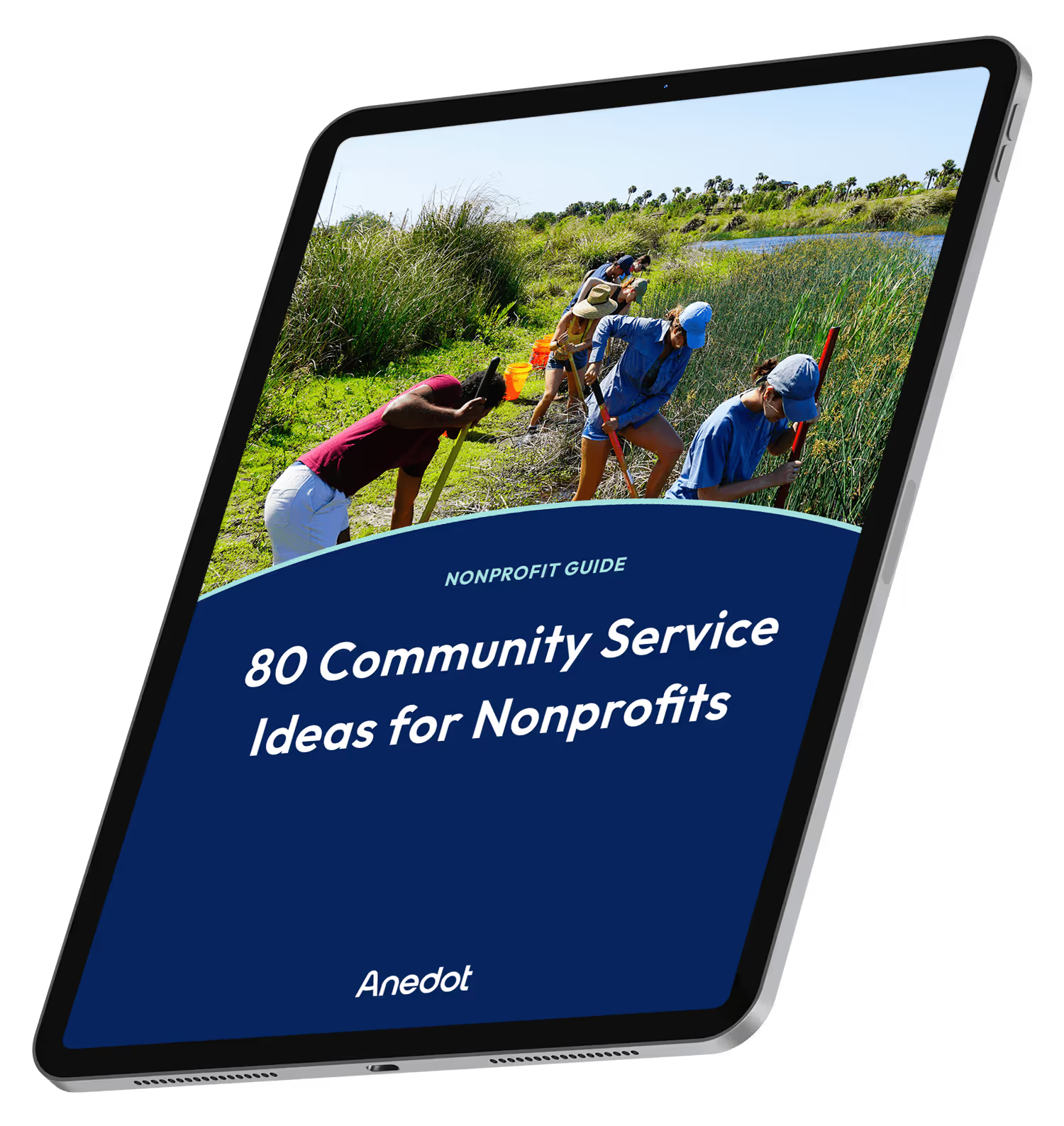
80 Community Service Ideas for Nonprofits

